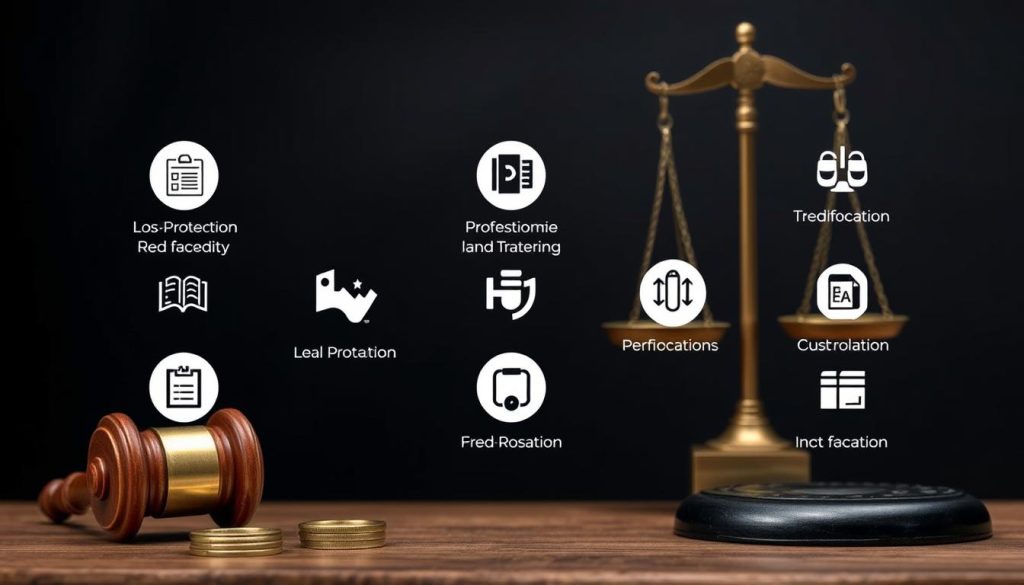In today’s rapidly evolving market landscape, professional services have become essential strategic assets rather than mere operational expenses. The Global Professional Services Market reached a valuation of USD 6.02 Trillion in 2022 and is projected to exceed USD 10.17 Trillion by 2031, growing at a rate of 6.4% through 2032.
As businesses navigate complex challenges, they require specialized expertise and knowledge to secure their future growth. The services industry encompasses a wide range of specialized fields, including business advisory, technology consulting, financial services, and legal protection.
Table of Contents
Key Takeaways
- Understand the fundamental structures and delivery models of professional services.
- Learn how to select the right services providers for your specific needs.
- Discover strategies for maximizing the return on your professional services investments.
- Explore the evolution of services in the digital age.
- Identify how modern services delivery models are adapting to meet changing client expectations.
Understanding Professional Services: The Foundation of Business Success
Professional services are the backbone of modern business, providing specialized expertise that drives success. These services are characterized by their knowledge intensity and the high level of qualifications among their professionals.
What Defines Professional Services in Today’s Market
Professional services represent specialized fields requiring advanced expertise, formal qualifications, and specific industry knowledge. The core definition centers around knowledge-intensive work delivered by highly trained professionals who apply specialized skills to address client challenges.
Examples include traditional fields like accounting, legal services, and management consulting, as well as emerging specialties in technology consulting, data analytics, and digital transformation.
The Evolution of Professional Services in the Digital Age
The digital transformation has fundamentally changed how professional services are delivered, creating new service categories while reshaping traditional offerings to incorporate technology-enabled solutions.
Modern professional services have evolved from primarily project-based engagements to include subscription models, managed services, and outcome-based arrangements that align provider success with client results.
Types of Professional Services That Safeguard Your Future
In today’s fast-paced business environment, understanding the diverse types of professional services available is crucial for long-term success. Different types of professional services often complement each other, creating integrated solutions that address complex business challenges from multiple angles simultaneously.
Essential Business Advisory Services
Business advisory services form the backbone of strategic decision-making, offering expertise in management consulting, organizational development, and operational efficiency. These services help businesses navigate market challenges and identify growth opportunities. For more information on how business advisory services can support your business, visit complementary services for independent workers.

Technology and IT Consulting Services
Technology and IT consulting has become increasingly critical as digital transformation reshapes industries. Services range from cybersecurity and information systems implementation to custom software development and technology strategy. This expertise enables businesses to leverage technology for improved efficiency and competitiveness.

Financial and Legal Protection Services
Financial and legal protection services provide essential safeguards through risk management, compliance advisory, intellectual property protection, and financial planning. These services shield organizations from potential threats and liabilities, ensuring a secure foundation for growth.

How Professional Services Organizations Operate
Understanding how professional services organizations operate is crucial for businesses seeking to leverage these services effectively. The professional services function has evolved from a loose grouping of consultants into a fully mature organization in many cases.
Structure and Management of Professional Services Teams
The structure of professional services teams typically includes a core management team, specialized practice areas organized by expertise, and supporting functions such as operations, finance, and talent management. Effective team management is critical for delivering high-quality services and ensuring client satisfaction.
Service Delivery Models: Project-Based vs. Subscription
Service delivery models have diversified beyond traditional project-based engagements to include subscription services and hybrid approaches. Project-based delivery focuses on defined outcomes with clear start and end dates, while subscription models provide continuous access to expertise and resources for a recurring fee. This flexibility allows professional services organizations to adapt to various client needs.
As professional services continue to evolve, understanding their operational frameworks is essential for maximizing the value of these partnerships. By recognizing how services teams are structured and how they deliver their services, businesses can better align their expectations with provider capabilities.
Selecting the Right Professional Services for Your Needs

The success of your project depends on selecting a professional services provider that meets your specific needs. With so many options available, it’s crucial to have a systematic evaluation process in place.
Key Criteria for Evaluating Professional Service Providers
When evaluating service providers, consider their technical expertise, industry experience, cultural fit, and demonstrated performance with similar clients. Look for providers with a proven track record of success, depth of relevant expertise, and a team with the right skills and qualifications.
Understanding Service Level Agreements and Deliverables
Service Level Agreements (SLAs) form the contractual foundation of professional services engagements. They define specific deliverables, quality standards, timelines, and remediation processes if expectations aren’t met. Understanding SLAs is essential to ensure that your needs are met and that you’re getting the best value for your investment.
Cost Structures: Billable Hours, Fixed Rates, and Value-Based Pricing
Different services providers offer various cost structures, including billable hours, fixed rates, and value-based pricing. Understanding these structures is crucial for budgeting and evaluating value. Billable hours provide flexibility but less cost certainty, while fixed rates offer predictability for defined scopes. Value-based pricing aligns fees with measurable business outcomes, ensuring that you’re getting a return on your investment.
By carefully evaluating professional services providers based on key criteria, understanding SLAs, and considering different cost structures, you can make an informed decision that meets your needs and drives business success.
Maximizing Value from Professional Services Partnerships
To get the most out of your professional services partnerships, it’s essential to understand how to maximize their value. By doing so, you can drive business growth and achieve success in your industry.
Building Effective Client-Consultant Relationships
Building effective client-consultant relationships is crucial for successful professional services partnerships. This involves establishing clear communication channels, defining decision-making processes, and fostering a collaborative environment where both parties contribute their unique expertise. For more information on developing a strong client base, visit https://blog.simulateur-portage-salarial.fr/developper-sa-clientele-en-portage-salarial/.
Measuring ROI and Performance Metrics
To measure the effectiveness of professional services engagements, it’s essential to track both quantitative and qualitative metrics. This includes cost savings, revenue growth, and efficiency gains, as well as knowledge transfer and capability building. The following table illustrates key performance metrics for professional services partnerships:
| Metric | Description | Target Value |
|---|---|---|
| Cost Savings | Reduction in operational costs | 15% |
| Revenue Growth | Increase in revenue generated | 20% |
| Efficiency Gains | Improvement in process efficiency | 12% |
Leveraging Professional Expertise for Long-Term Growth
Professional services can drive long-term growth by transferring knowledge to your internal teams, building sustainable capabilities, and helping your organization develop frameworks for ongoing improvement. By leveraging professional expertise effectively, you can achieve success and stay ahead of the competition.
Conclusion: Investing in Professional Services as a Strategic Asset
As businesses navigate the complexities of the modern marketplace, professional services are emerging as a vital resource. The global professional services industry is projected to exceed USD10.17 Trillion by 2031, underscoring its growing importance.
The most successful companies view professional services as strategic assets, developing systematic approaches to provider selection, engagement management, and value measurement. By leveraging external expertise, businesses can complement internal capabilities, accelerate strategic initiatives, and drive growth.
As technology continues to transform business models, professional services providers are evolving their offerings to include digital transformation, data analytics, and technology implementation. Investing in the right services at the right time can provide competitive advantages through access to specialized talent and methodologies.
FAQ
What are the key benefits of partnering with a professional services firm?
By partnering with a professional services firm, businesses can tap into specialized expertise, enhance their operations, and drive growth. This collaboration can lead to improved efficiency, reduced costs, and increased competitiveness in the market.
How do I choose the right professional services team for my business needs?
To select the right professional services team, consider factors such as their expertise, experience, and service delivery models. It’s essential to evaluate their ability to understand your business goals and tailor their services to meet your specific requirements.
What are the different types of project management services available?
Project management services can vary, including traditional project management, agile methodologies, and hybrid approaches. The choice of service depends on the project’s complexity, scope, and the client’s preferences.
How do technology consulting services support business growth?
Technology consulting services help businesses leverage the latest technology trends, improve their IT infrastructure, and enhance their digital presence. This support enables companies to stay competitive, streamline operations, and drive innovation.
What are the advantages of value-based pricing models?
Value-based pricing models align the cost of services with the value delivered to the client. This approach incentivizes professional services firms to deliver high-quality results, as their compensation is directly tied to the outcomes achieved.
How can I measure the ROI of a professional services partnership?
To measure the ROI of a professional services partnership, track key performance metrics such as cost savings, revenue growth, and process improvements. Regularly assessing these metrics helps businesses evaluate the effectiveness of the partnership and make informed decisions.
What are the essential elements of a service level agreement?
A service level agreement (SLA) should outline the scope of work, service standards, and expectations for both parties. It typically includes details on deliverables, timelines, and communication protocols to ensure a successful partnership.





